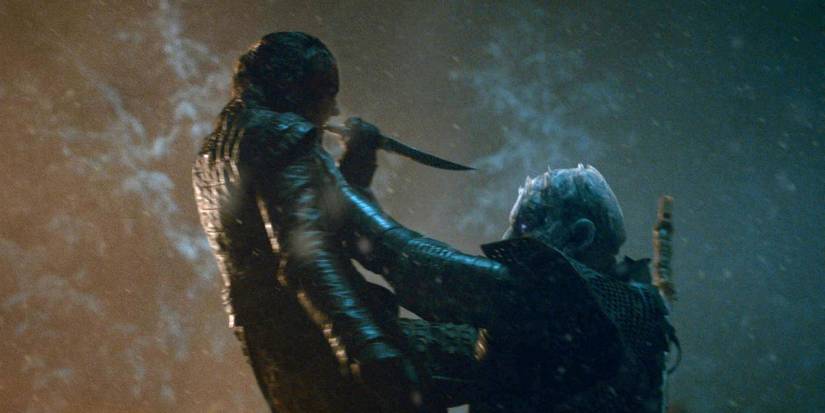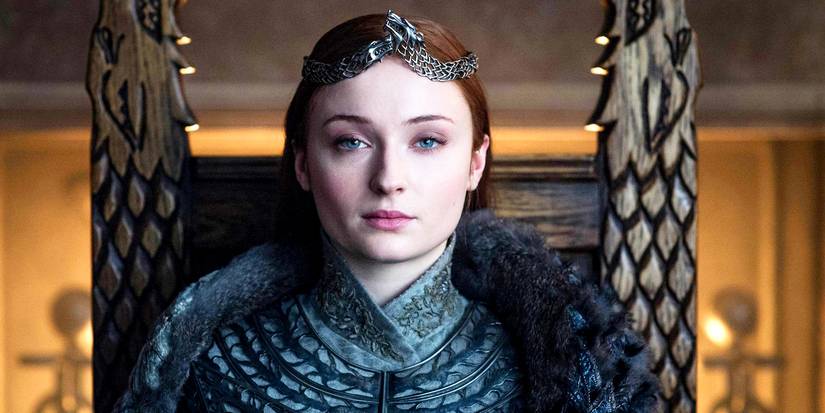The stakes couldn’t have been higher when Game of Thrones’ finale premiered in spring 2019. After long reigning as one of the biggest, most bold, award-winning, prestige shows on TV, Game of Thrones season 8 was met with complaints from new and long-standing fans, lamenting a downfall in narrative pacing, lighting issues, set mistakes (we’ll never forget the coffee cup), accusations of character assassination, and an unsatisfying ending.
Back when Game of Thrones’ ending arrived, I admittedly didn’t agree with some of the more widespread gripes about the final season. I enjoyed the calm before the storm of “A Knight of the Seven Kingdoms,” I understood Sansa’s rejection of Daenerys and desire to protect the North, I believe Dany becoming the “Mad Queen” was fitting for her arc, and, yes, I even believe Jon Snow killing Daenerys and never ascending the Iron Throne was the right move.
I may disagree with the intensity of the backlash against Game of Thrones season 8, but I’ve always acknowledged many of the flaws that I believe truly kept it from being a phenomenal final act to a masterclass work of storytelling. From pacing issues to certain character fates (the jury is still out on King Bran), there are some creative choices I can’t defend.
Unfortunately, those complaints have become more justified by the franchise’s expansion (or lack thereof) in the six years since the original finale. From massive lore-changing reveals and controversial release strategies with Game of Thrones’ TV spinoffs and George R.R. Martin’s long-delayed novels, several problems that plagued the finale have become even more relevant as time goes on.
House Of The Dragon’s Reveal About Aegon’s Dream Proves Jon Should Have Killed The Night King, Not Arya
When House of the Dragon debuted on HBO in the summer of 2022, the prequel series provided not just a huge milestone in the network’s franchise expansion efforts, but also an opportunity to redeem Game of Thrones’ finale backlash, get back disillusioned fans, and help salvage the property’s divisive reputation.
To accomplish that, a big, authentic, thrilling, lore-filled premiere would be required, and House of the Dragon certainly delivered. The very first episode of the prequel series, following members of House Targaryen over 150 years prior to the events of Game of Thrones, concluded with King Viserys’ jaw-dropping reveal of King Aegon I Targaryen’s prophetic dream, which he called the “Song of Ice and Fire:”
“Aegon foresaw the end of the world of men. It’s to begin with a terrible winter, gusting out of the distant North. Aegon saw absolute darkness riding on those winds, and whatever dwells within will destroy the world of the living. When this great winter comes, Rhaenyra, all of Westeros must stand against it. And if the world of men is to survive, a Targaryen must be seated on the Iron Throne. A King or Queen, strong enough to unite the realm against the cold and the dark. Aegon called his dream ‘The Song of Ice and Fire.'”
In other words, Aegon saw that the Night King would return with an army of wights to destroy humanity during a treacherous winter, with his descendant being the key to uniting mankind and defeating those forces. Game of Thrones shows us the prophesied Targaryen was Jon Snow or Daenerys Targaryen, and there are good arguments to make for either or both being the Prince That Was Promised.
However, while Daenerys and Jon (at first separately, then together by season 7) successfully brought armies from all over the world to battle Game of Thrones’ White Walkers, neither was the one to kill the Night King. That moment was, controversially, given to Arya Stark, who stabbed the Night King with the Targaryens’ ancestral Valyrian steel dagger to dissipate his entire army.
Arya killing the Night King instead of Jon was a major source of contention after Game of Thrones’ final season, as the battle against the White Walkers was among the most crucial aspects of Jon’s story since day one. It was Jon who emphasized their threat to various leaders around the world, including Daenerys, so many felt that the only proper way to conclude that story would be for Jon to be the one wielding the dagger.
After several years, the reveal of Aegon’s dream in House of the Dragon only further proved the point that it should have been Jon who killed the Night King. A Targaryen would unite the realm and defeat the threat deep in the north, and Jon was the most fitting character for that prophecy. Not only is he secretly a trueborn Targaryen, but he was raised in the North as a Stark (bastard) – Jon’s story is truly the Song of Ice and Fire.
Aegon’s Dream Being Fulfilled Makes Bran Becoming King Of The Remaining Kingdoms More Ridiculous
House of the Dragon’s retcon with Aegon’s dream also exacerbates the contention around Bran Stark becoming king in Game of Thrones’ ending. There are plenty of arguments against Bran being crowned, with some being that Bran did not have the “best story,” as Tyrion told the other leaders in Westeros, that Bran’s emotionless demeanor would keep him from being an effective leader, and that Bran himself had no interest in assuming his inherited roles in Winterfell, so why should he do so in King’s Landing?
However, House of the Dragon’s new Targaryen lore also makes the case that a united kingdom in Westeros under one monarch is no longer necessary after fulfilling Aegon’s Song of Ice and Fire dream. The prequel retconned Aegon’s Conquest by revealing it was driven by fulfilling his prophecy rather than a matter of hubris, greed, and power. Aegon had to unite Westeros to combat the White Walkers, eventually causing seven kingdoms to lose their independence.
Once the White Walkers were defeated, there wasn’t much point in still having one monarch rule over the formerly independent regions of Westeros. Just like how the North seceded and Sansa was crowned Queen in the North in the finale, that option should have been accessible to other regions, such as Dorne or the Iron Islands.
The biggest problem with this conclusion when taking Aegon’s dream into consideration is that Bran, as the Three-Eyed Raven, would have access to these conversations and prophecies from Game of Thrones’ history. Bran would certainly have some knowledge about why Aegon united the kingdoms of Westeros, which makes his decision to still rule over six regions of the realm as a monarch all the more confusing.
New Spinoffs Are Repeating A Crucial Flaw With Game Of Thrones’ Ending
Another divisive aspect of Game of Thrones season 8 that the franchise has yet to properly redeem is its pacing issues. Game of Thrones season 8 only had six episodes, compared to the first six seasons having 10 episodes each and season 7 containing seven entries.
With so many important battles, character arc conclusions, shocking twists, and major changes in the realm, six episodes wasn’t going to cut it for what season 8 needed to cover. Now, House of the Dragon and A Knight of the Seven Kingdoms repeat that complaint.
House of the Dragon season 1 had 10 episodes, though season 2 returned with only eight, suffering again from complaints regarding its pacing. Making matters worse, HBO’s A Knight of the Seven Kingdoms only has six episodes, begging the question of how much necessary lore and worldbuilding for this era in Targaryen history can fit into that length.
The Winds Of Winter’s Continued Delay Makes It Even Harder For Fans To Get The “Real” Conclusion
Perhaps now an even more controversial topic than Game of Thrones’ TV ending is the fact that George R.R. Martin has yet to publish The Winds of Winter, the sixth novel in the unfinished A Song of Ice and Fire series. Martin still needs to publish The Winds of Winter and its sequel, A Dream of Spring, to hopefully conclude the series’ main story, giving audiences clarity on the “real” ending compared to HBO’s adaptation.
Martin began writing The Winds of Winter approximately 15 years ago, and there’s still no official release date. The continued delays in the novel’s publication have simultaneously contributed to frustrations over Game of Thrones’ ending and its differences to Martin’s book – as there’s still no confirmation about how different it actually is, or how the TV show “should” have gone.
Once the book is released, those debates can finally be (relatively) settled. Whether that makes the backlash to the series’ ending worse or gives long-time fans a greater appreciation for HBO’s conclusion remains to be seen, but for now, it still lingers as a sensitive subject in the dialogue around Game of Thrones’ final season.









